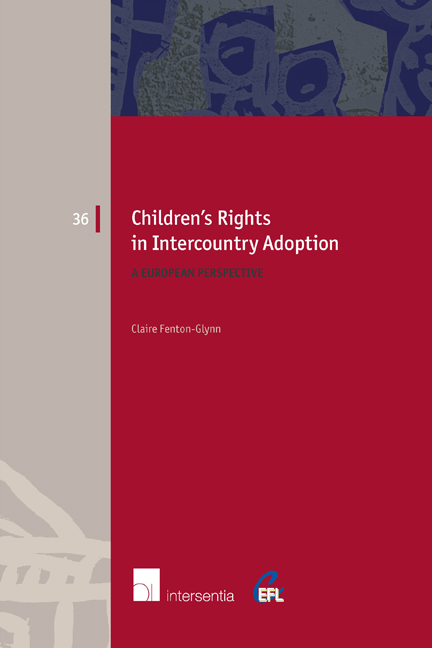Book contents
- Frontmatter
- Dedication
- Acknowledgements
- Contents
- Table of Cases
- Chapter 1 Introduction
- Chapter 2 Combating Abuses: International and Regional Regulation
- Chapter 3 Intercountry Adoption and the Domestic Child Welfare System: The Principle of Subsidiarity
- Chapter 4 Consenting Adults: Giving and Receiving Consent to Adoption
- Chapter 5 Buying Babies: The Inducement of Consent
- Chapter 6 Compulsory Adoption: Adoption Without Consent
- Chapter 7 Child Participation: Autonomy and Protection
- Chapter 8 Adoptive Parents: Eligibility, Preparation, and Support
- Chapter 9 Who Am I? The Child's Right to Identity
- Chapter 10 Conclusion
- List of Legislation
- Literature
- Index
- About the Author
- Miscellaneous Endmatter
Chapter 5 - Buying Babies: The Inducement of Consent
Published online by Cambridge University Press: 26 November 2017
- Frontmatter
- Dedication
- Acknowledgements
- Contents
- Table of Cases
- Chapter 1 Introduction
- Chapter 2 Combating Abuses: International and Regional Regulation
- Chapter 3 Intercountry Adoption and the Domestic Child Welfare System: The Principle of Subsidiarity
- Chapter 4 Consenting Adults: Giving and Receiving Consent to Adoption
- Chapter 5 Buying Babies: The Inducement of Consent
- Chapter 6 Compulsory Adoption: Adoption Without Consent
- Chapter 7 Child Participation: Autonomy and Protection
- Chapter 8 Adoptive Parents: Eligibility, Preparation, and Support
- Chapter 9 Who Am I? The Child's Right to Identity
- Chapter 10 Conclusion
- List of Legislation
- Literature
- Index
- About the Author
- Miscellaneous Endmatter
Summary
One of the most serious problems that arises in relation to intercountry adoption, and the one that is most publicised by the media, is that of the improper inducement of consent from birth parents. Wherever intercountry adoption has occurred, there have been allegations of the buying of children, of birth parents being deceived, and of improper practices on the part of those facilitating the adoption process.
Although these problems are not confined to intercountry adoption, they generally do not arise in relation to domestic transactions, in large part because of the financial incentives that are associated with the intercountry adoption system. This section will look at the requirements for valid consent under the international instruments, and the practical problems that have arisen in this regard. In doing so, it will use examples from various countries involved in intercountry adoption, including non-European countries. However, the purpose of this chapter is not to enumerate all the scandals that have arisen concerning intercountry adoption in the last 25 years, nor to claim that all systems suffer from the same defects. It will bring attention to these incidents only to better understand the practices that the law must consider when regulating this area in Europe.
INTERNATIONAL INSTRUMENTS
The improper inducement of consent in relation to adoption is not explicitly considered under the UNCRC, with article 21 only covering improper gain by intermediaries, which will be discussed in more detail below. However, article 35 requires that member states take “national, bilateral and multilateral measures to prevent the abduction of, sale of, or traffic in children for any purpose or in any form”, which has been taken up in the Optional Protocol to the UNCRC on the Sale of Children, Child Prostitution and Child Pornography. The Optional Protocol has 163 parties, including all European states save the Czech Republic, Ireland and Russia, who have signed but not ratified the Protocol.
This Protocol, which specifically refers to the Hague Convention on Intercountry Adoption, defines the sale of children as “any act or transaction whereby a child is transferred by any person or group of persons to another for remuneration or any other consideration”, and includes illegal adoption.
- Type
- Chapter
- Information
- Children's Rights in Intercountry AdoptionA European Perspective, pp. 81 - 104Publisher: IntersentiaPrint publication year: 2014



